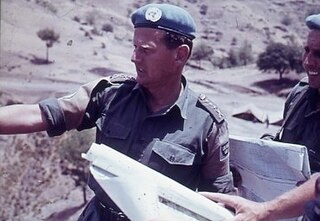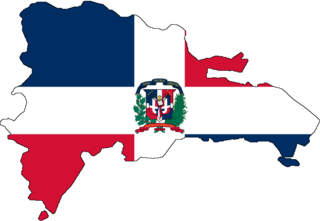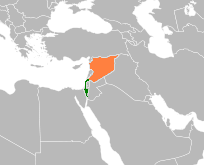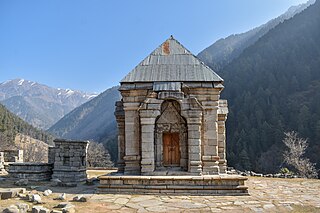
A ceasefire, also spelled cease-fire, is a stoppage of a war in which each side agrees with the other to suspend aggressive actions often due to mediation by a third party. Ceasefires may be between state actors or involve non-state actors.

United Nations Security Council Resolution 339 was adopted on 23 October 1973 in order to bring a ceasefire in the Yom Kippur War where Resolution 338 two days before had failed.

United Nations Security Council Resolution 80, adopted on March 14, 1950, having received the reports of the Commission for India and Pakistan, as well as a report from General A. G. L. McNaughton, the Council commended India and Pakistan for their compliance with the ceasefire and for the demilitarization of Jammu and Kashmir and agreement on Fleet Admiral Chester W. Nimitz as the future Plebiscite Administrator.

United Nations Security Council Resolution 91, adopted on March 30, 1951, noting a report by Sir Owen Dixon, the United Nations Representative for India and Pakistan, stating that the main point of difference of preparing the state of Jammu and Kashmir for the holding of a plebiscite were as follows; the procedure for and extent of demilitarization, the degree of control over the exercise of the functions of government necessary to ensure a free and fair plebiscite.

United Nations Security Council Resolution 96, adopted on November 10, 1951, having received a report by Mr. Frank Graham, the United Nations representative for India and Pakistan, as well as hearing his speech before the Council a basis for a program of demilitarization was noted with approval. The Council noted with gratification the declaration by both India and Pakistan that they would work for a peaceful settlement, continue to observe a cease-fire and accepted the principle that the accession of the State of Jammu and Kashmir should be determined by a free and impartial plebiscite under the auspices of the United Nations. The Council then instructed the UN Representative to continue in his efforts to obtain agreement of the parties on a plan for effecting the demilitarization of the State of Jammu and Kashmir and to report back on his efforts together with his view concerning the problems confided to him within six weeks.

United Nations Security Council Resolution 98, adopted on December 23, 1952, urged the Governments of India and Pakistan to enter into immediate negotiations under the auspices of the United Nations Representative for India and Pakistan in order to reach an agreement on the specific number of troops to remain of each side of the cease-fire line at the end of the previously established period of demilitarization. As proposed by the UN Representative this number was to be between 6000 Azad forces and 3500 Gilgit and northern scouts on the Pakistani side and 18000 Indian forces and 6000 local state forces on the Indian side. The resolution then thanked the UN Representative for his efforts, requested the Governments of India and Pakistan report to the Council no later than 30 days after the adoption of this resolution and asked the UN Representative to keep the Council informed of any progress.

United Nations Security Council Resolution 193 was adopted on August 9, 1964. After a serious deterioration of the situation in Cyprus, the Council reaffirmed an appeal to Turkey, to cease bombarding the island, and to Cyprus, ordering all her armed forces to cease firing. The Council called upon all to co-operate fully with the Commander of the United Nations Peacekeeping Force in Cyprus and to refrain from any action that might exacerbate or broaden the hostilities.
United Nations Security Council Resolution 199, adopted on December 30, 1964, requested that all States refrain from intervening in the domestic affairs of the Congo and appealed for a cease-fire there. After applauding the Organization for African Unity the Council called on States to assist it in achieving its objectives in the Democratic Republic of the Congo.

United Nations Security Council Resolution 203, adopted on May 14, 1965, in the face of growing instability, a developing civil war and the probability of foreign intervention in the Dominican Republic, the Council called for a strict cease-fire and invited the Secretary-General to send a representative to the Dominican Republic to report to the council on the present situation.

United Nations Security Council Resolution 205, adopted on May 22, 1965, in the face of a potentially widening conflict in the Dominican Republic, the Council requested that the temporary suspension of hostilities in Santo Domingo called for in United Nations Security Council Resolution 203 be transformed into a permanent cease-fire and invited the Secretary-General to submit a report to the Council on the implementation of this resolution.

United Nations Security Council Resolution 209, adopted on September 4, 1965, with a deteriorating situation along the cease-fire line in Kashmir, the Council called upon both India and Pakistan to take all steps necessary to immediately cease fighting and return to their respective sides of the line. The Council also called on the two governments to co-operate fully with the United Nations Military Observer Group in Pakistan and asked the Secretary-General to report back on the implementation of the resolution within three days.

United Nations Security Council Resolution 210, adopted unanimously on September 6, 1965, after receiving a report by the Secretary-General on the developments in the situation in Kashmir, the Council called on the parties to cease hostilities in the entire area of conflict immediately and withdraw all armed personnel to the positions they held before August 5, 1965. The Council requested the Secretary General do all he possibly could to give effect to the present resolution and resolution 209 as well as strengthening the United Nations Military Observer Group in Pakistan. The Council then decided to keep the issue under urgent and continuous review.

United Nations Security Council Resolution 211 was adopted on September 20, 1965. After the calls for a cease-fire in resolutions 209 and 210 went unheeded, the Council demanded that a cease-fire take effect at 0700 hours GMT on September 22 and that both forces withdraw to the positions held before August 5. The Council requested the Secretary-General ensure the supervision of the cease-fire and called on all states to refrain from any action which might aggravate the situation. The Council also decided that as soon as a cease-fire could be reached it would consider what steps could be taken to assist towards a settlement of the political problem underlying the conflict.

United Nations Security Council Resolution 215, adopted on November 5, 1965, after the cease-fire called for in resolutions 209, 210, 211 and 214 and agreed to by India and Pakistan failed to materialize, the Council demanded that representatives of India and Pakistan meet with a representative of the Secretary-General to purpose schedules for the withdrawals. The Council urged this meeting to take place as soon as possible and requested the Secretary-General to submit a report on compliance with this resolution.

United Nations Security Council Resolution 235, adopted on June 9, 1967, after noting that the governments of both Israel and Syria have accepted the Council's demand for a cease-fire, the Council demanded that hostilities should cease forthwith and requested that the Secretary-General make immediate contacts with the Governments of Israel and Syria to immediately arrange compliance with the cease-fire and to report to the Security Council within 2 hours of the resolution.

United Nations Security Council Resolution 236, adopted on June 11, 1967, after noting the oral reports of the Secretary-General, the Council condemned any violations of the cease-fire called for in resolution 234. The Council requested that the Secretary-General continue his investigations and report back as soon as possible and affirmed its demand for a cease-fire. The Council called for the prompt return to the cease-fire positions of any troops which may have moved forward subsequent to 16:30 hours GMT on June 10, 1967, and called for the full co-operation with the Chief of Staff of the United Nations Truce Supervision Organization and the observers in implementing the cease-fire.

United Nations Security Council Resolution 240, adopted on October 25, 1967, condemned the violations of the cease-fire worked out in past resolutions and expressed its regrets at the casualties and loss of property that resulted from the violations. The Council reaffirmed the necessity of the strict observance of the cease-fire resolutions and demanded that the member states concerned cease immediately all prohibited military activities in the area and co-operate fully and promptly with the United Nations Truce Supervision Organization.

United Nations Security Council Resolution 270, adopted on August 26, 1969, after an air attack by Israel on Southern Lebanon, the Council condemned Israel and deplored all incidents in violation of the cease-fire and the extension of the area of fighting. The Council also declared that such grave violations of the cease-fire could not be tolerated and that the Council would have to consider further and more effective steps as envisaged in the Charter.

United Nations Security Council Resolution 307, adopted on December 21, 1971, after hearing statements from India and Pakistan, the Council demanded that a durable cease-fire be observed until withdrawals could take place to respect the cease-fire line in Jammu and Kashmir. The council also called for international assistance in the relief of suffering and rehabilitation of refugees as well as their return home and a request for the Secretary-General to keep the council informed on developments.

United Nations Security Council resolution 937, adopted on 21 July 1994, after reaffirming resolutions 849 (1993), 854 (1993), 858 (1993), 876 (1993), 881 (1993), 892 (1993), 896 (1994), 901 (1994), 906 (1994) and 934 (1994), the Council expanded the United Nations Observer Mission in Georgia (UNOMIG) to include co-operation with the Commonwealth of Independent States (CIS) and extended its mandate until 13 January 1995.













